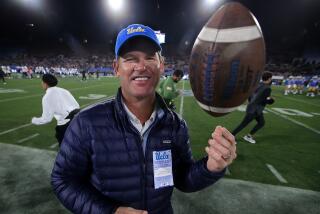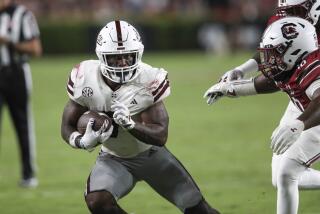Young players on the Watts Bears are part of a larger team effort
The Watts Bears might be the only football team in the Pop Warner league run by men with guns and badges.
The squad of 7-, 8- and 9-year-olds is drawn from housing projects in Watts and coached by officers from the Los Angeles Police Department.
For the cops it’s part of community policing, aimed at building neighborhood bonds and reducing gang-related crime. For the boys it’s a chance to hit somebody, with police officers cheering them on.
But there wasn’t much hitting in Saturday’s game at Cathedral High. The Bears didn’t score; they lost to the Southern California Falcons by 32 points.
They missed tackles, dropped balls, drew penalty calls — and seemed to tune out coaches yelling from the sidelines: Stay on the ball! Watch the quarterback! Don’t back away from your man!
By halftime, when the score was 19-0, coach Sergio Sanchez was scouring his playbook, “Watts Bears: Top Secret Formations.” And the boys were refusing to keep their helmets on because it was too hot.
Still, every time the whistle blew, the coaches swallowed their frustration and praised a player for something:
“Beautiful run” to the boy on the verge of tears because he’d fumbled the ball. “Good hustle” to the kid who needed his inhaler after trying to stop a touchdown. High-fives to the jubilant player who actually tackled someone.
Sanchez said only two of the 21 boys on the team had ever played football when practice began in June. “They’re awed just to be on the field. They’re still working on ‘Coach, where do I stand?’”
The team is 1-3 right now. With luck, they might finish the season at .500.
But that’s not what matters most to Sanchez and fellow coaches Grant Goosby, Zarren Thompson and Cesar Rivera, who all patrol Watts housing projects when they’re not teaching youngsters the three-point stance.
“This is a building year for us,” Sanchez told me on Saturday, as his team lined up for the bus trip back to Watts.
And what they’re trying to build is not a gridiron dynasty, but a relationship that will strengthen an entire community.
::
The football team is the product of a partnership between the Police Department and the city’s Housing Authority, which oversees housing projects that used to account for much of the crime and violence in Watts.
Officers who patrol the projects now do more than make arrests. They coach football and track, take children on field trips, to dance classes, science centers, horseback-riding lessons. They visit schools, talk with teachers and monitor players’ grades and homework.
It’s a test of “relationship policing” as a way to make life safer and break through generations of hostility between LAPD officers and residents of the projects. The program started two years ago; since then, there’s been just one shooting death in Watts’ largest housing projects, compared with 43 homicides in the previous six years.
Police don’t get all the credit. But parents I spoke with at Saturday’s game said their presence makes a difference.
Many said they’d been afraid to let their children play organized sports because local leagues play at parks where gang rivalries raise the risk of violence.
Tamika Allen’s 8-year-old son Mekhi plays guard for the Bears. Or maybe tackle. She is not sure which.
But she is sure that “he would not be on that field if the officers weren’t out there with him.”
“When you have the police, it feels more protected when you’re practicing or at the games. You feel safe. Because if anything pops off with gangbangers, you’ve got all these officers around; everybody’s going to jail.”
Her comment pierced my suburban complacency. I’ve spent years sitting on sports fields, watching my daughters compete. And I never had to worry about gunfire or keep my children off the team because of gang rivalries.
::
The fliers that came home from their children’s schools didn’t say police were involved. That might have been a turnoff in a neighborhood where officers, for generations, have been considered an occupying force.
“We had no real relationship before,” coach Sanchez said. “People might have wanted us there, but they didn’t trust us.”
Now, single mothers especially are beginning to see the officers as a source of opportunity rather than a ticket to jail for their young sons.
“I thank God they came,” said Melody Culpepper, mother of 7-year-son Malachi Russ. “It changed the image that’s been in my head about the police. You hear ‘po-po, po-po coming’ and you know what that means.
“Before, most of the time we get a look, they’re harassing people in the neighborhood. This is a different look, a different feel.”
And if this effort changes how they see police, maybe it will also change how police see them.
More to Read
Start your day right
Sign up for Essential California for news, features and recommendations from the L.A. Times and beyond in your inbox six days a week.
You may occasionally receive promotional content from the Los Angeles Times.






